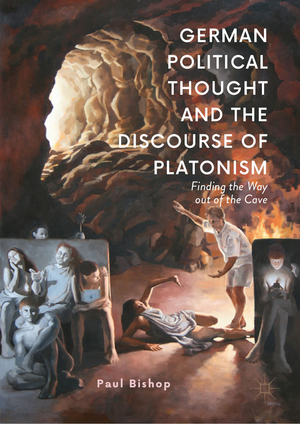German Political Thought and the Discourse of Platonism: Finding the Way Out of the Cave
Autor Paul Bishopen Limba Engleză Hardback – 5 feb 2019
Preț: 649.39 lei
Preț vechi: 763.99 lei
-15% Nou
Puncte Express: 974
Preț estimativ în valută:
124.26€ • 130.07$ • 103.42£
124.26€ • 130.07$ • 103.42£
Carte tipărită la comandă
Livrare economică 31 martie-14 aprilie
Preluare comenzi: 021 569.72.76
Specificații
ISBN-13: 9783030045098
ISBN-10: 3030045099
Pagini: 434
Ilustrații: XXIII, 408 p. 10 illus., 1 illus. in color.
Dimensiuni: 148 x 210 mm
Greutate: 0.67 kg
Ediția:1st ed. 2019
Editura: Springer International Publishing
Colecția Palgrave Macmillan
Locul publicării:Cham, Switzerland
ISBN-10: 3030045099
Pagini: 434
Ilustrații: XXIII, 408 p. 10 illus., 1 illus. in color.
Dimensiuni: 148 x 210 mm
Greutate: 0.67 kg
Ediția:1st ed. 2019
Editura: Springer International Publishing
Colecția Palgrave Macmillan
Locul publicării:Cham, Switzerland
Cuprins
Chapter 1: What is politics?.- Chapter 2: Plato and the cave.- Chapter 3: Aristotle and the empirical approach.- Chapter 4: Rousseau and the social contract.- Chapter 5: Kant and the categorical imperative.- Chapter 6: Hegel and the dialectic.- Chapter 7: Marx & Engels: the revolution.- Chapter 8: Nietzsche & Heidegger: a glance to the Right.- Chapter 9: The Frankfurt School — Adorno & Horkheimer.- Chapter 10: Habermas and communicative action.- Chapter 11: By Way of Conclusion.
Notă biografică
Paul Bishop is William Jacks Chair of Modern Languages at University of Glasgow, UK. His previous publications include Carl Jung (2014), A Companion to Friedrich Nietzsche, Life and Works (2012), and Nietzsche and Antiquity: His Reaction and Response to the Classical Tradition (2004).
Textul de pe ultima copertă
Taking Plato’s allegory of the cave as its starting-point, this book demonstrates how later European thinkers can be read as a reaction and a response to key aspects of this allegory and its discourse of enchainment and liberation. Focusing on key thinkers in the tradition of European (and specifically German) political thought including Kant, Marx, Hegel, Nietzsche, Heidegger, and the Frankfurt School, it relates them back to such foundational figures as Rousseau, Aristotle, and in particular Plato. All these thinkers are considered in relation to key passages from their major works, accompanied by an explanatory commentary which seeks to follow a conceptual and imagistic thread through the labyrinth of these complex, yet fascinating, texts. This book will appeal in particular to scholars of political theory, philosophy, and German language and culture.
Paul Bishop is William Jacks Chair of Modern Languages at University of Glasgow, UK. His previous publications include Carl Jung (2014), A Companion to Friedrich Nietzsche, Life and Works (2012), and Nietzsche and Antiquity: His Reaction and Response to the Classical Tradition (2004).
Paul Bishop is William Jacks Chair of Modern Languages at University of Glasgow, UK. His previous publications include Carl Jung (2014), A Companion to Friedrich Nietzsche, Life and Works (2012), and Nietzsche and Antiquity: His Reaction and Response to the Classical Tradition (2004).
Caracteristici
Presents an engaging and original exploration of German political thought in relation to Plato’s seminal allegory of the cave Examines the relation between the individual and society, the primacy of the economic, our engagement with the material world, the notion of the contract, and the function of the state Opens up arguments about Plato and his influence on Western political thought
